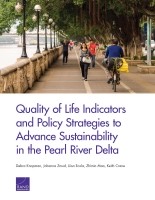| 来源类型 | Research Reports
|
| 规范类型 | 报告
|
| DOI | https://doi.org/10.7249/RR871
|
| ISBN | 9780833090973
|
| 来源ID | RR-871-DHURDGP
|
| Quality of Life Indicators and Policy Strategies to Advance Sustainability in the Pearl River Delta |
| Debra Knopman; Johanna Zmud; Liisa Ecola; Zhimin Mao; Keith Crane
|
| 发表日期 | 2015
|
| 出版年 | 2015
|
| 页码 | 250
|
| 语种 | 英语
|
| 结论 |
Challenges for Improving Quality of Life in the Pearl River Delta (PRD)- Unplanned outward expansion of urban boundaries has led to fragmentation of both urban and rural land.
- Urban land is not utilized in a way that allows for efficient provision of public services and facilities.
- Historic and cultural preservation has been neglected.
- Current development patterns and processes do not adequately address the need for resilience from natural disasters.
- Without high-quality public transit alternatives, vehicle kilometers traveled in privately owned cars per capita will increase and congestion and air pollution will worsen.
- Road-based freight transport is a major source of congestion and safety problems.
- An extremely high number of deaths and serious injuries are caused by everyday use of the roads.
- Water and air pollution and soil contamination are causing significant harm to human health and ecological resources, and diminishing economic growth.
- Regulators have insufficient resources and incentives to enforce laws and standards.
- There is a lack of good-quality public rental housing and housing for purchase by middle-income residents.
- There is a lack of good-quality public rental housing for lower-income residents.
- Guangdong Province seeks to accelerate its economic transition.
Common Themes in Strategies to Address These Challenges- In general, the proposed strategies would increase compliance with regulations by improving the effectiveness of incentives; expand access to public services and quality improvements; increase the pace of improvements in public services and the environment; improve data and analysis to better guide decisionmaking; and reduce pollution and improve health and safety.
- In all areas, but particularly in land use, environment, and housing, there is an overarching need to increase transparency and accountability in regulation.
|
| 摘要 |
- Implementation of the indicator system should be staged over several years as strategies are initiated and data collected. After implementation, the system should be periodically updated to keep it fresh and relevant to Guangdong's needs.
- Certain strategies should be implemented earlier than others, based on their likely impact on progress toward goals, degree of difficulty, and time required to put the strategy in place.
- Although strategies will be implemented at the provincial and local levels by multiple agencies, central oversight and maintenance of the indicator system will be crucial to its success. RAND recommends a cross-agency and cross-government council approach with a single agency lead.
|
| 主题 | China
; Economic Development
; Environmental Quality
; Environmental Regulation
; Residential Housing
; Transportation Planning
; Urban Planning
|
| URL | https://www.rand.org/pubs/research_reports/RR871.html
|
| 来源智库 | RAND Corporation (United States)
|
| 引用统计 |
|
| 资源类型 | 智库出版物
|
| 条目标识符 | http://119.78.100.153/handle/2XGU8XDN/107934
|
推荐引用方式
GB/T 7714 |
Debra Knopman,Johanna Zmud,Liisa Ecola,et al. Quality of Life Indicators and Policy Strategies to Advance Sustainability in the Pearl River Delta. 2015.
|
|
文件名:
|
x1495296754532.jpg
|
|
格式:
|
JPEG
|

|
文件名:
|
RAND_RR871.pdf
|
|
格式:
|
Adobe PDF
|
除非特别说明,本系统中所有内容都受版权保护,并保留所有权利。